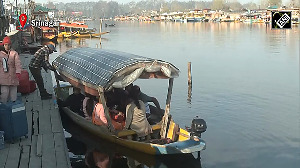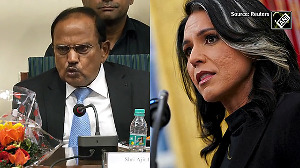 Former American Vice President and Nobel Laureate Al Gore has warned that the black carbon emissions in the subcontinent -- from kerosene lamps and cooking stoves -- and use of biomass fuels can ultimately adversely impact India's great rivers that are the lifeblood of the country's agricultural economy and its drinking water supply.
Former American Vice President and Nobel Laureate Al Gore has warned that the black carbon emissions in the subcontinent -- from kerosene lamps and cooking stoves -- and use of biomass fuels can ultimately adversely impact India's great rivers that are the lifeblood of the country's agricultural economy and its drinking water supply.
Gore said this while keynoting a gala -- Lighting a Billion Lives Reception and Dinner -- hosted by fellow Nobel Laureate Rajendra K Pachauri (chairman of the United Nations Intergovernmental Panel on Climate Change that shared the Nobel prize with Gore) at the conclusion of a full-day summit on US-India energy partnership organised by The Energy and Resources Institute and Yale University.
"One of the scientific realities that has become ever more clear, partly as a consequence of the work of the eminent Indian American (atmosphereic) scientist Dr V Ramanathan (of the University of California, San Diego's Scripps Institute of Oceanography), is that the so-called black carbon, which is different from the other global warming pollutants, is probably the third largest cause of global warming."
He said that Dr Ramanathan thinks its the second, but most of his colleagues would say its the third -- after carbon dioxide and methane.
Explaining that "it is really not a gas but tiny particles," Gore, who is chairman of the board of Alliance for Climate Protection and chairman, Generation Investment Management, said, "the reason I mention it is because it is a very illuminating example of how this problem defies the traditional breakdown between developed countries and developing countries and the capacity building and all of this."
Elaborating, he said, "The emissions of black carbon from the subcontinent settle on the ice and snow in the Himalayas and in the foothills and on the Tibetan plateau and by darkening the surface of that ice and snow, they cause much more of the sun's heat to be absorbed by that ice and snow, tremendously accelerating the melting process."
And, in warning why it would impact India in a way that would be unimaginable in the implications it would have, Gore said, "Of course, the great rivers of India -- including the Indus, the holy Ganga and the Bhramaputra -- originate in that ice and snow."
He said that he had met with several Indian glaciologists and had studied the images from the Indian space agency. What is happening to the ice and snow on which such a large percentage of the people of India depend for drinking water and for agricultural water is directly connected to this black carbon.
Gore acknowledged that "it is connected as well to the industrial emissions from the United States, from the deforestation in Indonesia, Brazil, and all of the causes that everyone knows about."
But, "the point I am making is that the direct cause and effect relationship between the burning of kerosene, of the cooking stoves... this is the proximate cause of a water shortage and the unfolding potential catastrophe that completely defies the human imagination," he said.
Gore said that it was unfortunate that "because of the way our minds work, it is natural and more difficult for all of us to take action in the present and prevent consequences that are a bit over the horizon. But some of those consequences are unfolding right now."
He said, "We see poor families near the shoreline that used to rebuild their lives every 20 years or so, now having to rebuild their lives every four or five years, and the burden is too great and so they are moving in and the refugees are crowding into cities and putting them at risk."
Gore said that "it is not my purpose on this occasion to go through a litany of why we must act, but rather just to make the subtle point that the shift in emphasis that your Prime Minister (Dr Manmohan Singh) and you (turning to environment minister Jairam Ramesh) and your able colleagues have now unveiled to the world, it is really so, so very welcome. We are in this together."
He went on to talk about how the late civil rights leader, Dr Martin Luther King "who inspired such a change and was himself inspired by Mahatma Gandhi," had once said that "injustice anywhere is a threat to justice everywhere."
"In our world, more global warming pollution anywhere is a threat to the future of civilization everywhere, and we all have to be a part of the solution," he emphasized.
He said that "what Dr Pachauri is doing in leading the scientific community of the entire planet to a realization of what needs to be done is just fantastic, and in the capacity that brings us here, I am so proud and honoured to support enthusiastically and wholeheartedly the lighting a billion lives campaign."
Gore said the campaign "is a very practical, very focused, very inspiring effort to transform people's lives and lift their prospects and simultaneously reduce this deadly global warming pollution."
He remarked, "There is an old African proverb that says, "If you want to go quickly, go alone. (But) If you want to go far, go together."
"We have to go far, quickly," Gore said, "and that's what Dr Pachauri's lighting a billion lives program is making possible and its a honor to be here and to give a helping hand to his great inspiring cause."








 © 2025
© 2025